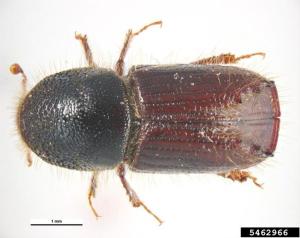AFBI remind the local forest industry to be vigilant against new threats to tree health
Date published:
AFBI plant health scientists are currently on high alert after a recent finding of a breeding population of the eight-toothed spruce bark beetle (Ips typographus Figure 1) in the south of England.

Forestry in Northern Ireland is valued at greater than £300 million, employs over 200 people directly, and draws more than half a million visitors annually. The eight-toothed spruce bark beetle has the potential to seriously damage Northern Ireland’s forests, as over 40% of the trees are spruce, a susceptible host of the beetle. The beetle is native to parts of Asia and Europe, and is commonly found in parts of mainland Europe. The UK and Ireland have a special plant health status in acknowledgement that the beetle is not established here.
AFBI is working with the Department of Agriculture, Environment and Rural Affairs (DAERA) to survey and trap the beetles should they ever arrive in Northern Ireland.
The AFBI entomology team, along with DAERA Forest Service, sample 14 forests and the three main ports in Northern Ireland annually to identify new and emerging pests to plant and tree health. In response to this outbreak in England, AFBI and DAERA plan to carry out additional surveys focussed on the areas in Northern Ireland at most risk from the beetle.
Furthermore, AFBI scientists have developed the Northern Ireland Plant Health Register in order to rank and prioritise the threats to plant health in Northern Ireland. The register, based on the UK Plant Health Risk Register, takes into account the specific circumstances in Northern Ireland, and rates the risk of the pest according to the likelhood the pest will arrive, the damage the pest could cause and the loss in value that would occur if the pest arrives and establishes.
Finally, the risk register examines what effect regulations could have to reduce the impact of the pest. At present, Ips typographus is the joint No. 1 risk along with 2 other tree threats (emerald ash borer, Phytophthora ramorum) and a bacterial threat (potato ring rot) to the Northern Ireland potato industry.
AFBI entomologist, Dr Archie Murchie stated that: “We are fortunate in being on an island off an island, and are therefore forewarned with the coming of these beetles in England. The Irish Sea is a natural barrier to the spread of pests but it is not absolute. Beetles can be carried on the wind long distances or can arrive in Northern Ireland on any manner of imported timber, vehicle or other produce, therefore vigilance is key.”
Members of the public, and industry can help DAERA and AFBI protect Northern Ireland’s high plant health status against this and other threatening pests. Suspicious pests and diseases of plants can be reported to the Department via tree check or by emailing the Department. Further information on this and other plant health pests, can be found on the Department website.
Notes to editors:
TreeCheck is an online platform for the reporting of potential pest or disease damage to plants and trees in the wider environment. It is used by both professionals and members of the public and is a joint venture between DAERA Forest Service Plant Health and the Department of Agriculture, Food and the Marine.Follow AFBI on TwitterAll media queries should be directed to the AFBI Press Office